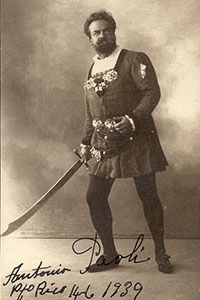The History of Antonio Paoli

Born: 14 April 1871 in Ponce, Puerto Rico.
Died: August 24 1946 San Juan, Puerto Rico
Puerto Rican Tenor.
The year 1871 was another good year for tenors. Another three noted artists were born then. One was Spanish, one French and one Russian. The Spaniard was in fact Puerto Rican by birth, with a very interesting blood mixture, having a Corsican father and a Venezuelan mother. He was a dramatic tenor, Antonio Paoli.
He spent his childhood with his sister in Spain, she being a court singer of the Spanish queen. Studies took place in Milan and his debut was in Valencia, in Lucia de Lammermuir in 1897.
1899 finds him in Paris replacing Augusto Affra in William Tell at the Paris opera. He married in 1900. I mention this because after the birth of his son in 1901, his wife took ill and spent the next 20 years in bed, a great misfortune for our singer and the cause of his apparently lonely way in life.
Now comes busy years, singing in Spain, Portugal, Italy, and Russia.
1903 La Faniche in Venice in Travatore with Ruffo and in Florence, his first Otello singing again with Ruffo
1904, Warsaw, Moscow St. Petersburg. There he was honored by Zarr Nicholas 2nd with a title of court singer.
1905 Spain at the Real Madrid. Great success in Aida and Travatore with Bonisenya and Otello . “Best performance of the season,” said the papers. Honored by the Queen with the title court singer, In Lisbon he sings Pagliacci under the baton of Leon Camaro the composer, who onstage, tells the world Tenino, with or without your beard you’re the best cameo in the world. Honored by the King of Portugal with the title of court singer.
1906 in Chile singing les Huguenots, L’affricaine, Aida and Travatore. Then Vienna as Otello, another great performance gets him the court singer award from the then emperor Franz Yosef.
1907 the San Carlo in Naples in Samson and Delilah, and in Milan, his first gramophone records including the first complete recording of an opera on gramophone records, il Pagliacci with the composer Leon Cavala conducting. So here he is, in the season of that year straight from the San Carl. An aria from Samson and Delilah
Arretez OMes Freres / Samson / 1907 – Antonio Paoli
1908 finds Paoli in Rome at the Constanza. Then Liceo in Barcelona, Spain’s greatest Opera House in Aida. He gets his court singer title in Berlin from Kaiser Wilhelm the 2nd after his Otello there. In Argentina he opens the newly rebuilt Cologne Theatre in his gala performance with a Ruffin Chaliapin and in the same year he sings before Pope Pius the 10th at the Vatican
1909 he sings in Cairo, Corsica, and Monaco and in 1910 comes his debut at La Scala as Samson, other roles there including L’Affricaine
1911 he is at the San Carlo, Naples. And tours Germany, Russia, Holland, and England
1912 Paoli sings in Vienna, Genoa and Florence and turns down a contract for the Metropolitan Opera for the second time. This is his last recording year. Altogether he made 53 titles for the gramophone company HMV. Here is The Prayer from Masani’s Le Cid made in 1908, the year he sang at the reopening of the cologne.
O Souverain / Le Cid / 1908 – Antonio Paoli
1913 finds Paoli in Lisbon, then he tours Costa Rica, Mexico, Colombia, and Brazil
1914 Florence first, then a tour of Asia and South Africa
1915 to 1917 the war interrupts his career. He takes up boxing, wins the five successive bouts and completely loses his voice.
1918 voice recovered. Sings in Milan, Bergamo, Turin, and Palermo
1919 this time at Florence, Athens, and Budapest and then off to Rio for Otello and Moses in Egypt
1920 his wife becomes very ill; he calls in the best doctors in Europe, to no avail. His wife dies of cancer and Paoli duly spends six months with his son in Puerto Rico. Opens at Le Constanza in Rome as Otello
1921 to 1924 finds the tenors in the usual routine, highlighted by a visit to San Juan. He gives a concert in his birthplace, Ponce. Where he is completely ignored by his fellow citizens, only 20 people turned up for his concert, he is deeply hurt and never again returns to his birthplace
1925 to 1930 he comes over with Emephelia and retires for five years
1931 to 1946 is spent teaching and founding a College in San Juan. And he dies there on Aug the 24th 1946, aged 75. Among his tenor colleagues, one critics where paid to him by Lothario, Lauri Volpi and Scipa. Lauri wrote admiringly of him in their memoirs.
So, to finish, I’m going to play 2 short passages, firstly a section of the duet Ah Matilde from Rossini’s, William Tell, where he’s joined by the baritone Cigada.
Ah Matilde w Cigada / William Tell / 1907 – Antonio Paoli
And then a historic moment where we shall hear him in an extract from the very first complete opera ever recorded I Pagliacci, conducted by the composer himself Leon Cavallo
Vesti La Giubba / Pagliacci / 1907 – Antonio Paoli

The History as it was Recorded
Sydney Rhys Barker
